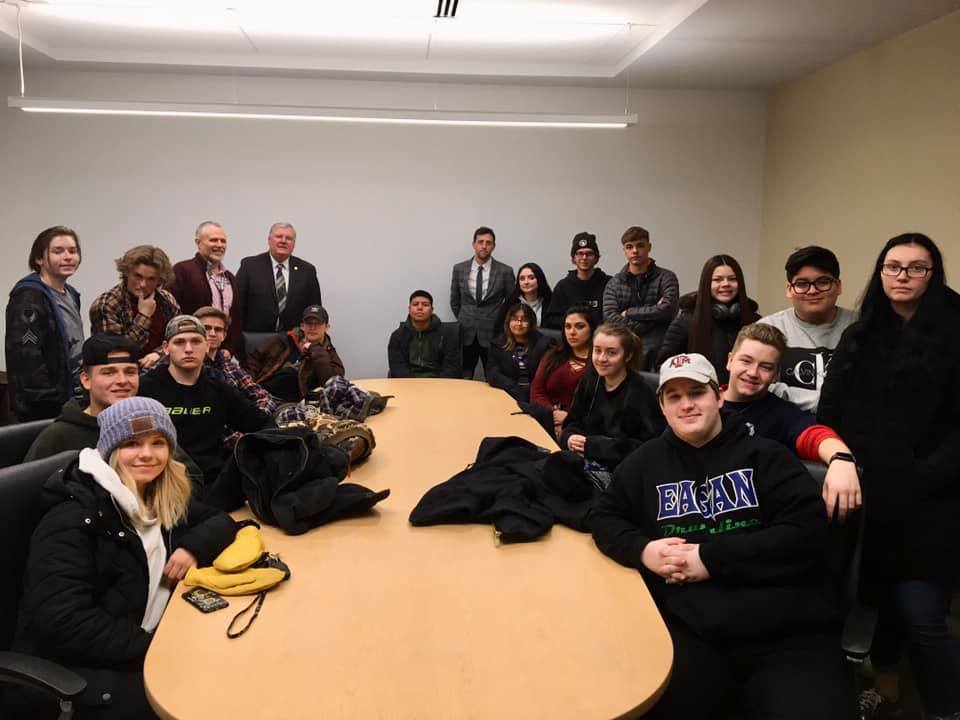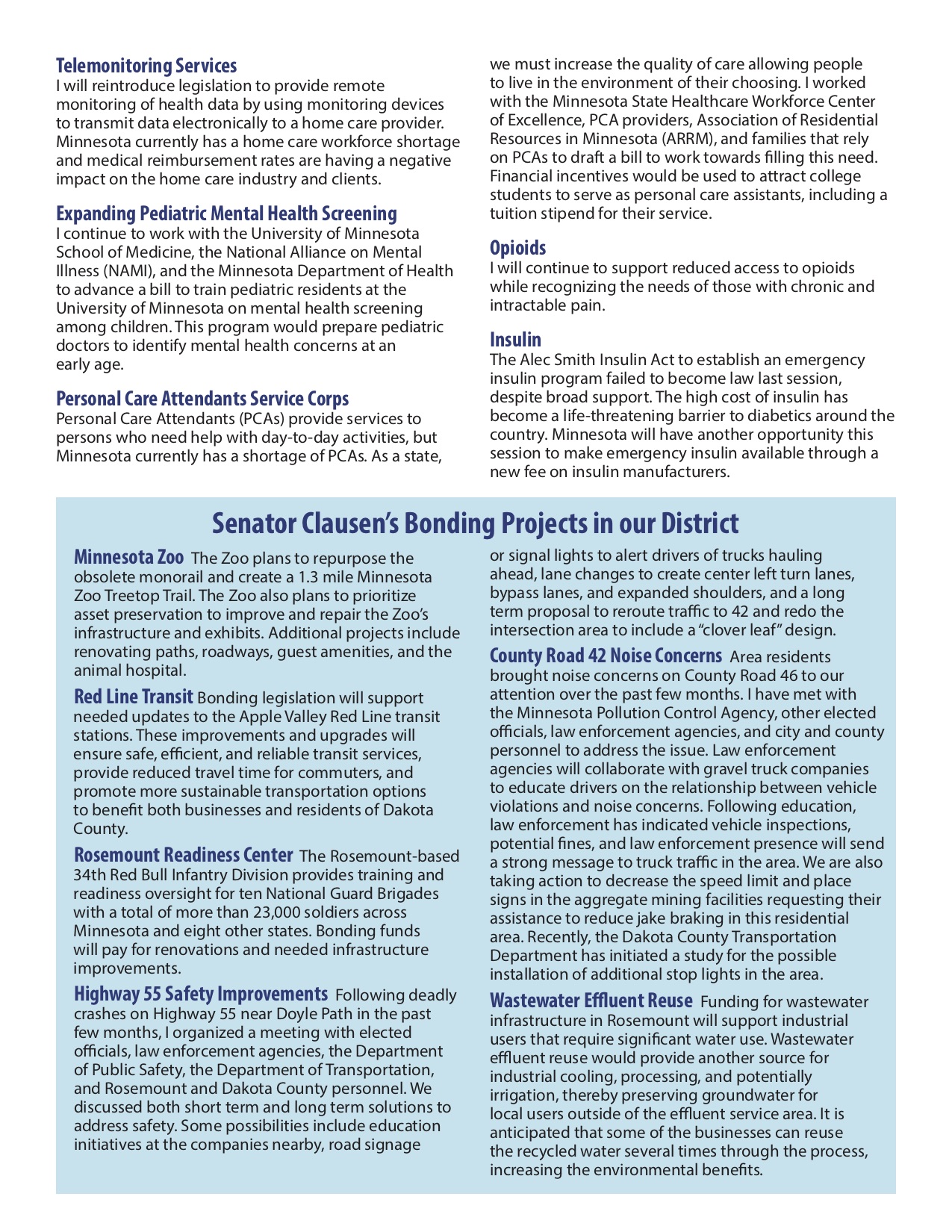Dear Neighbors,
The 2020 Minnesota legislative session started on Tuesday and we went right to work. I spent the week speaking with colleagues regarding bills I worked on over the interim. We have many important issues to continue discussing this session, including affordable health care, access to emergency insulin, building strong and safe public schools, investing in bonding projects in our communities, and protecting clean air and water. I also attended the annual One Minnesota Legislative Policy Conference this week, which is an opportunity to come together as Senators and Representatives across the aisle to discuss our responsibility in creating a productive legislative session for Minnesotans. Topics this year included economic and demographic realities, redistricting, negotiating skills and tools, and more.
Continue reading for more about what I have been up to this week and for some of my legislative priorities.
Connect with me on social media!
I am now on Instagram. Follow along @sengregclausen for updates from the Capitol and our district this legislative session. Additionally, my Twitter handle is @sengregclausen and my Facebook is @senatorclausen.
Click for links to my pages:
Instagram
Twitter
Facebook
Free Tax Preparation Sites in Minnesota
Minnesota offers free tax preparation sites to eligible participants across the state. Click here for more information from the Department of Revenue's press release.
Some meetings I've had leading up to and in the first week of session:
- Education Minnesota
- Alzheimer's Association
- Dakota County Legislative Workshop
- Dyslexia Working Group
- Minnesota Farmers Union constituent
- Dakota Area Learning Center Students (pictured below)

My Legislative Priorities
.jpg)

General Legislative Issues Expected in 2020
Bonding Bills
This session the legislature will prioritize bonding initiatives, whereas last session was a budget year. Bonding bills are an investment in Minnesota's infrastructure and create good-paying jobs throughout the state that boost both the local and state economies. Governor Walz and Lieutenant Governor Flanagan proposed investing $1.27 billion in community infrastructure projects across the state. The proposal balances the needs of the state, with 22% of projects in Greater Minnesota, 27% in the Twin Cities area, and 51% having impacts statewide. I have included some bonding requests for our district in the flier above. I will continue prioritizing necessary and targeted investments in our community and throughout Minnesota so our infrastructure keeps up with the needs of the people it serves.
Click here for a link to an article explaining Governor Walz's bonding package.
Healthcare
Minnesotans believe every person should have high-quality, affordable health care, no matter their gender, age, where they live, or where they work. Colleagues and I will continue working to expand access to affordable health care options to Minnesotans.
Insulin
Last session, colleagues and I worked with insulin advocates led by the mother of Alec Smith, a young man who died rationing his insulin, and we made repeated efforts to get the majority party to move on a program to provide low-cost emergency insulin funded through fees on insulin manufacturers. The cost of insulin has tripled in the last 10 years, raking in profits for pharmaceutical companies while leaving Minnesotans with diabetes scrambling to afford the drug they need to survive. This program needs to be a priority this session.
Childcare
Minnesota’s childcare costs consistently rank near the top of national lists. We are committed to a comprehensive solution that makes quality care more affordable and recognizes the true value of caregivers working in the field. Ensuring a younger generation is able to step into their full potential and contribute to our workforce is critical to Minnesota’s future economy.
Education
It is time to fully fund education in order to create a future in which all Minnesotans have a path to success. We need to make smart, significant funding increases in our schools to close the opportunity gaps our children are facing. We must also ensure college and technical schools are an affordable and attainable goal to grow and retain the 21st century workforce we need.
Achievement Gap
Minnesota has one of the widest achievement gaps in the country. We will explore options that work to retain quality teachers and encourage more to join the teaching profession.
School Safety
Feeling safe in school is essential for learning; students need to feel safe in school and feel a connection to teachers, staff, and other students. We need to provide funding to help schools expand resources to students in need, including:
- School Safety Assessment Teams to identify and assess potential concerns before they happen
- Environmental hazards mitigation; parents and staff should be notified when chemical/contamination issues occur at a school site
- Radon testing required and paid for through the long-term facilities program
- Suspension/expulsion reform
- School Safety Levy enhancements/increases
- Anti-lunching shaming policies that prohibit demeaning practices to collect lunch debt
- School-linked mental health grants (if there is a supplemental budget)
- Increased school support staff funding
- Cardiac arrest prevention bill
Higher Education
Minnesota law states the Legislature should provide at least 67% of the funding for public post-secondary schools and the remaining 33% is intended to be provided through the students and families. Unfortunately, the percentages in funding have been reversed, with the Legislature now providing about one-third of the necessary funding for higher education. We will continue looking at higher education funding alternatives.
Dual/Concurrent Enrollment Funding Increase
We need to increase funding to match the demand of students enrolling in concurrent enrollment programs, like College in the Schools. Helping students gain college credits while in high school means attaining a higher education will be more affordable.
Economic Security
We need to make sure every community thrives across Minnesota by expanding access to affordable childcare and housing, investing in infrastructure and broadband internet, and giving local leaders the tools they need to succeed.
Climate Change, Clean Energy, Environment
We recognize the importance of building a clean energy future with healthy communities, a healthy climate, and meaningful and dignified work for farmers, laborers, and everyone working for a living. We need to begin enacting many solutions available to us, including a transition to clean energy, supporting sustainable agriculture, and providing good-paying jobs that are environmentally friendly.
Clean Energy
In December, Governor Walz established a new Climate Change Subcabinet and Governor’s Advisory Council on Climate Change to promote coordinated climate change mitigation and resilience strategies in Minnesota. In December, the Senate DFL Caucus formed the Clean Energy and Climate Caucus. We will continue working together towards clean energy goals.
Election Security and Voter Rights
Federal Election Security Funding
During the 2016 election, Minnesota was one of 21 states targeted by foreign interference. In 2019, the legislature approved $6.6 million in federal Help America Vote Act (HAVA) funds that were withheld from the Secretary of State by the majority in the Senate since 2018. These funds are currently being used to update the Statewide Voter Registration System, improve post-election auditing, secure the transfer of voter data, improve website accessibility, train election officials, and upgrade cybersecurity systems. Congress has approved additional funding for election security, with Minnesota expected to receive $7.4 million. These funds are intended to assist counties—which directly administer the state’s elections—with software improvements, auditing, and training. The state match is 20% of the total appropriation for this round of grants, which will total $1.48 million. We will work to release these funds immediately so they can be used by county election officials across the state to secure the 2020 Presidential Election from foreign interference.
Presidential Primary Data Privacy
Last session, the party ballot selection data to be collected in the upcoming Minnesota 2020 Presidential Nomination Primary Election on March 3rd was classified as not public. The major political parties were provided access to the list of voters who voted in the primary and which political party's ballot they selected. The law requires the Secretary of State to submit a list of voters who voted in the presidential nomination primary to each major political party. This data will allow the parties to know which party ballot all voters selected but not which specific candidate they voted for.
Many constituents have voiced their concerns to me. Potential voters are concerned that their party ballot preference data could be used to discredit their professional objectivity or could be publicly released by another political party. My colleague Senator Rest intends to author Legislation supported by Secretary of State Steve Simon to further restrict access to the ballot selection list and only transfer the data to the national party or a designee to meet party primary requirements.
Thank you!
I am honored to serve another session as your state senator. If you have any questions regarding the above priorities or any topics not included, please do not hesitate to reach out. My door is always open to meeting with you or talking on the phone.
Respectfully,

Greg Clausen
Minnesota State Senator
Senate District 57
|